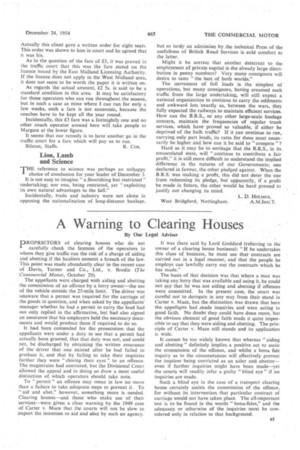A Warning to Clearing Houses
Page 31

If you've noticed an error in this article please click here to report it so we can fix it.
By Our Legal Adviser PROPMETORS of clearing houses who do not carefully check the licences of the operators to whom they give traffic run the risk of a charge of aiding and abetting if the hauliers commit a breach of the law. This point was made abundantly clear in the recent case of Davis, Turner and Co., Ltd., v. Brodie (The COmmerciat Molar, October 29).
The appellants were charged with aiding and abetting the commission of an offence by a lorry owner—the use of the vehicle outside the 25-mile limit. The driver was unaware that a permit was required for the carriage of the goods in question, and when asked by the appellants' manager whether he had a permit to carry the load had not only replied in the affirmative, but had also signed an assurance that his employers held the necessary documents and would produce them if required to do so.
It had been contended for the prosecution that the appellants were under a duty to see that a permit had actually been granted, that that duty was not, and could not, be discharged by obtaining the written assurance of the driver that one existed after he had failed to produce it, and that by failing to take their inquiries further they were "closing their eyes" to an offence. The magistrates had convicted, but the Divisional Court allowed the appeal and in doing so drew a most useful distinction of which operators should take note.
To " permit " an offence may mean in law no more than a failure to take adequate steps to prevent it. To " aid and abet," however, something more is needed. Clearing houses—and those who make use of their services—were given a clear warning by the 1949 case of Carter v. Mace that the courts will not be slow to import the intention to aid and abet by such an agency. It was there said by Lord Goddard (referring to the owner of a clearing house business): "If he undertakes this class of business, he must see that contracts are carried out in a legal manner, and that the people he employs can lawfully carry out the contracts which he has made."
The basis of that decision was that where a man was taking any lorry that was available and using it, he could not say that he was not aiding and abetting if offences were committed. In the present case, the court was careful not to derogate in any way from their stand in Carter v. Mace, but the distinction was drawn that here the appellasits had made inquiries and were acting in good faith. No doubt they could have done more, but the obvious element of good faith made it quite impossible to say that they were aiding and abetting. The principle of Carter v, Mace still stands and its application is wide.
It cannot be too widely known that whereas "aiding and abetting" definitely implies a positive act to assist the commission of the offence, and whilst a bona fide inquiry as to the circumstances will effectively prevent the inquirer being convicted as an alder and abettor— even if further inquiries might have been made--yet the courts will readily infer a guilty "blind eye" if no inquiries are made.
Such a blind eye in the case of a transport clearing house certainly assists the commission of the offence, for without its intervention, that particular contract of carriage would not have taken place. The all-important test is to be found in the words "bona-fides," and the adequacy or otherwise of the inquiriesmust be considered only in relation to that background.












































































